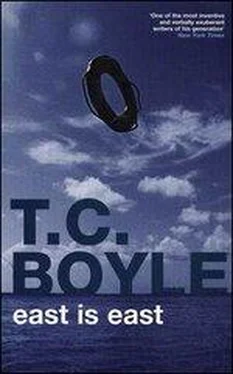But now they were closing in on it, whatever it was—he could see something thrashing around in the weeds up ahead—and Jeffie suddenly sang out: “It’s a bear! A—a—a brown one, a big brown bear!” ’
A bear! Jeff could feel his blood racing—a bear could turn on them, upset the canoe, deliver them in an instant to the snakes and gators and snapping turtles. He backpaddled hard, his eyes leaping at the vegetation ahead—there it was, a snatch of brown, the maiden cane trembling, a splash, then another—
But it wasn’t a bear after all—and they had a good laugh over that one—it was a pair of otters. Otters. “My god,” Julie gasped, “you had me scared half to death, Jeffie.” She’d dropped the binoculars in her lap and her face was pale under the brim of the pith helmet. The otters darted under the boat, bobbed up again and gave them an inquisitive look.
They were like puppies, that was what they reminded him of, sleek and playful puppies, and they instantly incorporated the canoe into their game of tag. It was a thrill, and they watched them for half an hour before Jeff remembered himself, checked his watch and got them going again.
They were on a schedule, and they had to stick to it—by law. Jeff had made reservations for this canoe trip a year in advance, as soon as he’d gotten a firm commitment from Turner and put the house up for sale. The Park Service allowed only six canoe parties at a time to overnight in the swamp, and competition for those six spots was fierce. Each party had to follow a set itinerary and was required, by park regulations, to arrive at its designated camping platform by 6 P.M., when the rangers closed the park down for the night and all fishermen, bird-watchers and other day trippers were required to return to the dock. The Park Service literature explained that this six o’clock deadline—all paddles out of the water, all overnighters to be on their platforms—had been established for the canoeists’ own safety. It was dangerous out here, what with the gators, the cottonmouths, coral snakes and rattlers, and that gave Jeff a thrill too—but he was sensible and punctual and he didn’t really like surprises, and he always obeyed the law to the letter, even on the highway, where he stuck doggedly to 55 while the big rigs and Japanese sports cars shot past him as if he were parked in the driveway. The Park Service allowed them eight hours to get from platform to platform, and so they had plenty of time to dawdle and see the sights, but after the otter business they were running late. Jeff dug deep with his paddle.
It was quarter to six in the evening, and he was beginning to stew—had they taken a wrong turn somewhere?—when Jeffie crowed, “I see it, I see it, dead ahead!”—and there it was, the elevated platform that was their second night’s destination. The weathered support beams and the crude roof detached themselves from the wall of vegetation, a great blue heron lifted itself into the air with a clap of its wings, and they were there, gliding up to the platform on a burning shimmer of light. Like the platform on which they’d camped the previous evening, this one was three hundred feet square and roofed with porous planks, and it rose a precarious three feet above the water level of the swamp. Its amenities consisted of a chemical toilet, a charcoal brazier and a logbook, in which each overnighter was required to record date and time of arrival and departure.
Jeff Jr. and Julie steadied the canoe while Jeff clambered up onto the platform, alert for snakes or lizards in the rafters—or anything else that crept, crawled or climbed. The previous night Julie had let out a shriek they could have heard back in Atlanta when a coachwhip suddenly appeared from one of the overhead beams, plunged into the potato salad and lashed itself across the floor and into the duckweed on the far side of the platform. This time, they were taking no chances. Jeff was thorough, visually inspecting the beams and the underside of the platform, and poking a stick into each of the overhead crannies where beam and plank came together. Then he turned to the logbook. The Murdocks, of Chiltonberry, Arkansas, had preceded them, and in the space reserved for comment they’d observed: “Skeeter Hell.” Before them it was the Ouzels of Soft Spoke, Virginia, and all they had to say was: “Beautiful stars.” It was the line above the Ouzels’ that caught his eye—someone, described only as “Fritz” and whose handwriting was so pinched and secretive Jeff could barely make it out, had written: “Note: 14′ gator can get up on platform.” “Can” was underlined three times.
“Jeff, what’s taking you so long? I’ve got to use the ladies’.”
“Yeah, sure,” he replied absently, wondering if he should mention the acrobatic gator and deciding that he would, but later, after supper, when they were all settled in for the night. “All clear,” he called, keeping it simple.
Jeff made a fire with the real oak briquettes he’d brought along from Atlanta, and Julie extracted three princely New York strip steaks from the cooler. They shared a beer and Jeff Jr. had a Coke while the steaks sizzled and sent up a clean searing aromatic smoke that for a while overwhelmed the reek of the mud and disoriented the mosquitoes. The water was shallow out back of the platform—no more than shin-deep—but out front there was a considerable pool, an enlarged gator wallow, no doubt, and Jeff kept his eye on this for the agile gator, who for all Jeff knew liked his steak rare. Jeffie got out his fishing pole, but Jeff and Julie both insisted that he practice his clarinet first—they believed that an individual should be well-rounded, and though Jeff Jr. was only ten, they were already looking ahead to college admissions—and so while the meal cooked and Jeff swirled his half a can of warm beer round a plastic camp cup, the angst-ridden strains of Carl Nielsen floated out over bog, hammock and wallow, tempering the mindless twitter of the birds and tree frogs with a small touch of precision.
After dinner it began to cloud over and Jeff suspended a groundcloth from the beams to cut the wind from the southeast, where lightning had begun to fracture the sky and the distant dyspeptic rumble of thunder could be heard. Then he built up the fire with an armload of pine branches he’d thought to collect earlier in the day, and the family gathered round to roast marshmallows, swat mosquitoes and tell stories. “Well,” Jeff said, settling down beside Julie as the groundcloth flapped and the smoke swirled, “you all know why this great swamp is called the Okefenokee—”
“Oh, come on, Dad—you’ve already told us about fifty thousand times already.”
“Jeffie, now don’t you use that tone with your father—”
“—the land of trembling earth, because it’s important to the story I’m going to tell, a tragic story, horrible in its way”—and here Jeff paused to let the adjectives work their spell on his audience, while the rumble of the thunder came closer and closer—“the story of Billy Bowlegs, last of the great Seminole chiefs.”
Jeff Jr. was sitting cross-legged on one of the flotation cushions. He leaned forward, that alert look he got when he was practicing or doing his homework settling into his eyes and the incipient furrows of his brow. “It’s because the peat rises in mats and trees grow on them and stuff and then when you try to walk on it you fall through—like Mom yesterday. It was so funny. It was like”—his tone had begun in the adenoidal reaches of exasperation, but now he was enjoying himself, riding the pleasure of his own authority—“like all these little trees were attacking her or something.”
Jeff brought him back. “Right, Jeffie: and what is peat?”
“Um, it’s like coal, right?”
Читать дальше











